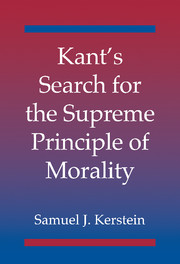Book contents
- Frontmatter
- Contents
- Acknowledgments
- Key to Abbreviations and Translations
- Introduction: Derivation, Deduction, and the Supreme Principle of Morality
- 1 Fundamental Concepts in Kant's Theory of Agency
- 2 Transcendental Freedom and the Derivation of the Formula of Universal Law
- 3 The Derivation of the Formula of Humanity
- 4 The Derivation of the Formula of Universal Law: A Criterial Reading
- 5 Criteria for the Supreme Principle of Morality
- 6 Duty and Moral Worth
- 7 Eliminating Rivals to the Categorical Imperative
- 8 Conclusion: Kant's Candidates for the Supreme Principle of Morality
- Notes
- Index
Introduction: Derivation, Deduction, and the Supreme Principle of Morality
Published online by Cambridge University Press: 06 September 2009
- Frontmatter
- Contents
- Acknowledgments
- Key to Abbreviations and Translations
- Introduction: Derivation, Deduction, and the Supreme Principle of Morality
- 1 Fundamental Concepts in Kant's Theory of Agency
- 2 Transcendental Freedom and the Derivation of the Formula of Universal Law
- 3 The Derivation of the Formula of Humanity
- 4 The Derivation of the Formula of Universal Law: A Criterial Reading
- 5 Criteria for the Supreme Principle of Morality
- 6 Duty and Moral Worth
- 7 Eliminating Rivals to the Categorical Imperative
- 8 Conclusion: Kant's Candidates for the Supreme Principle of Morality
- Notes
- Index
Summary
No Modest Claim
If there is a supreme principle of morality, then it is the Categorical Imperative. This claim, which lies at the core of Kant's ethics, is nothing if not ambitious. Establishing it would amount to proving that absolutely no principle other than the Categorical Imperative – no utilitarian principle, no perfectionist principle, no principle along the lines of the Ten Commandments – is a viable candidate for the supreme principle of morality. How does Kant (or might he) try to prove this? Does he (or might he) succeed? Questions of this sort are what this book is about. To answer them, we must understand what Kant means by claiming that if there is a supreme principle of morality, then it is the Categorical Imperative.
The Basic Concept of the Supreme Principle of Morality
To begin we need to know how Kant conceives of the supreme principle of morality. According to (what I call) his basic concept, this principle would possess four characteristics. It would be practical, absolutely necessary, binding on all rational agents, and would serve as the supreme norm for the moral evaluation of action. I call this concept of the supreme principle of morality basic because it emerges immediately in Kant's critical writings in ethics. Already in the Preface to the Groundwork of the Metaphysics of Morals it is manifest that, in Kant's view, the supreme principle must have these features.
- Type
- Chapter
- Information
- Kant's Search for the Supreme Principle of Morality , pp. 1 - 15Publisher: Cambridge University PressPrint publication year: 2002



